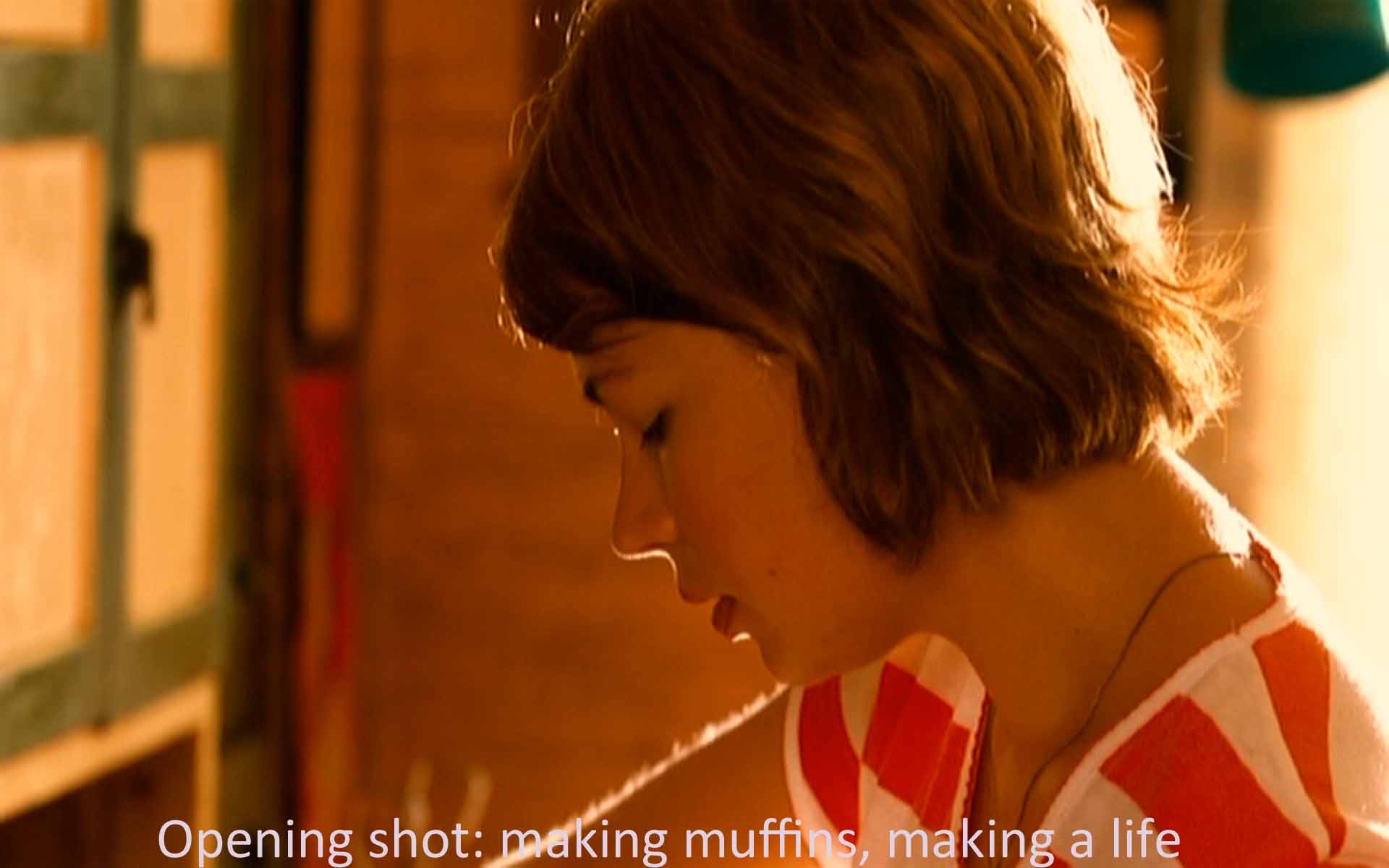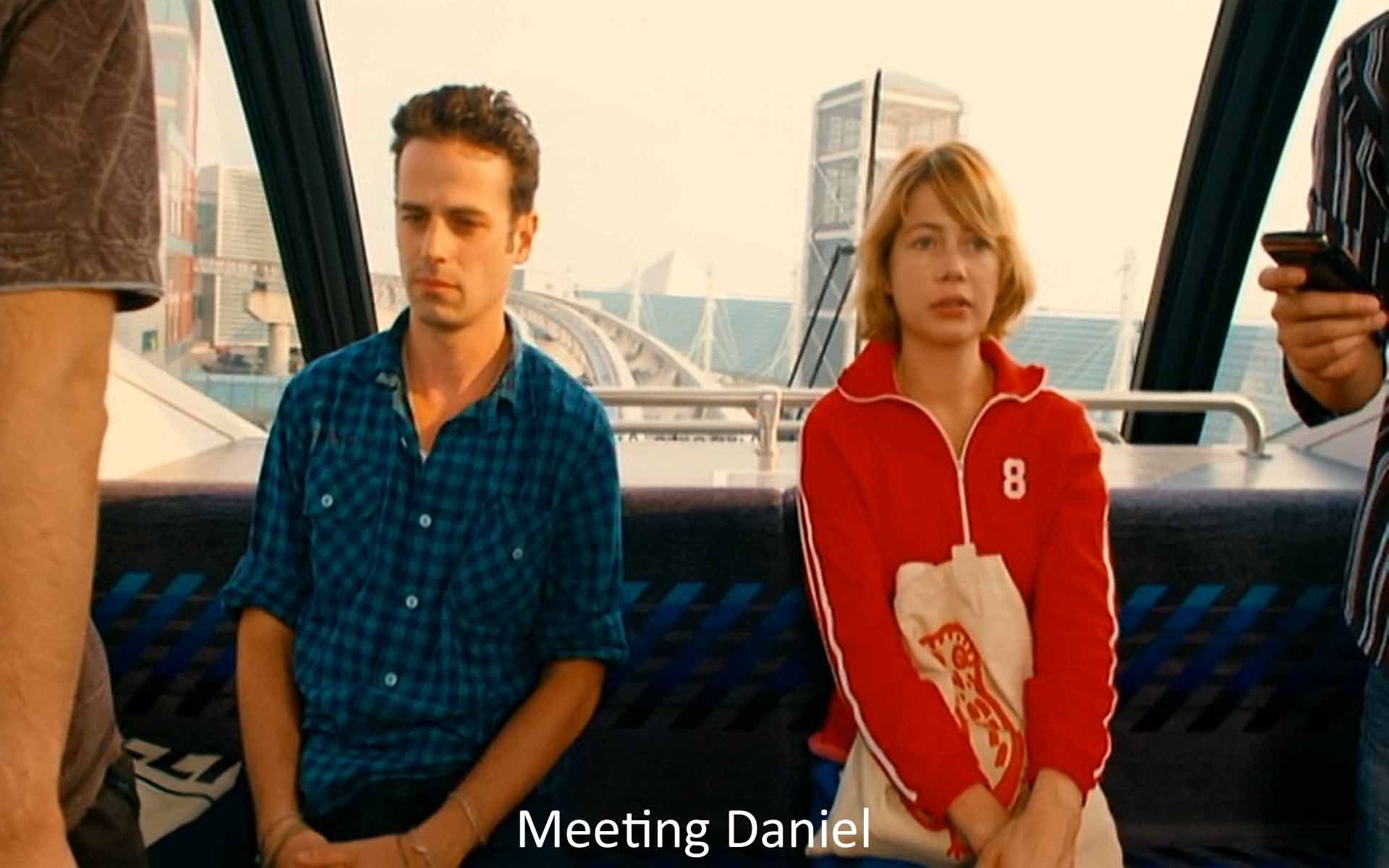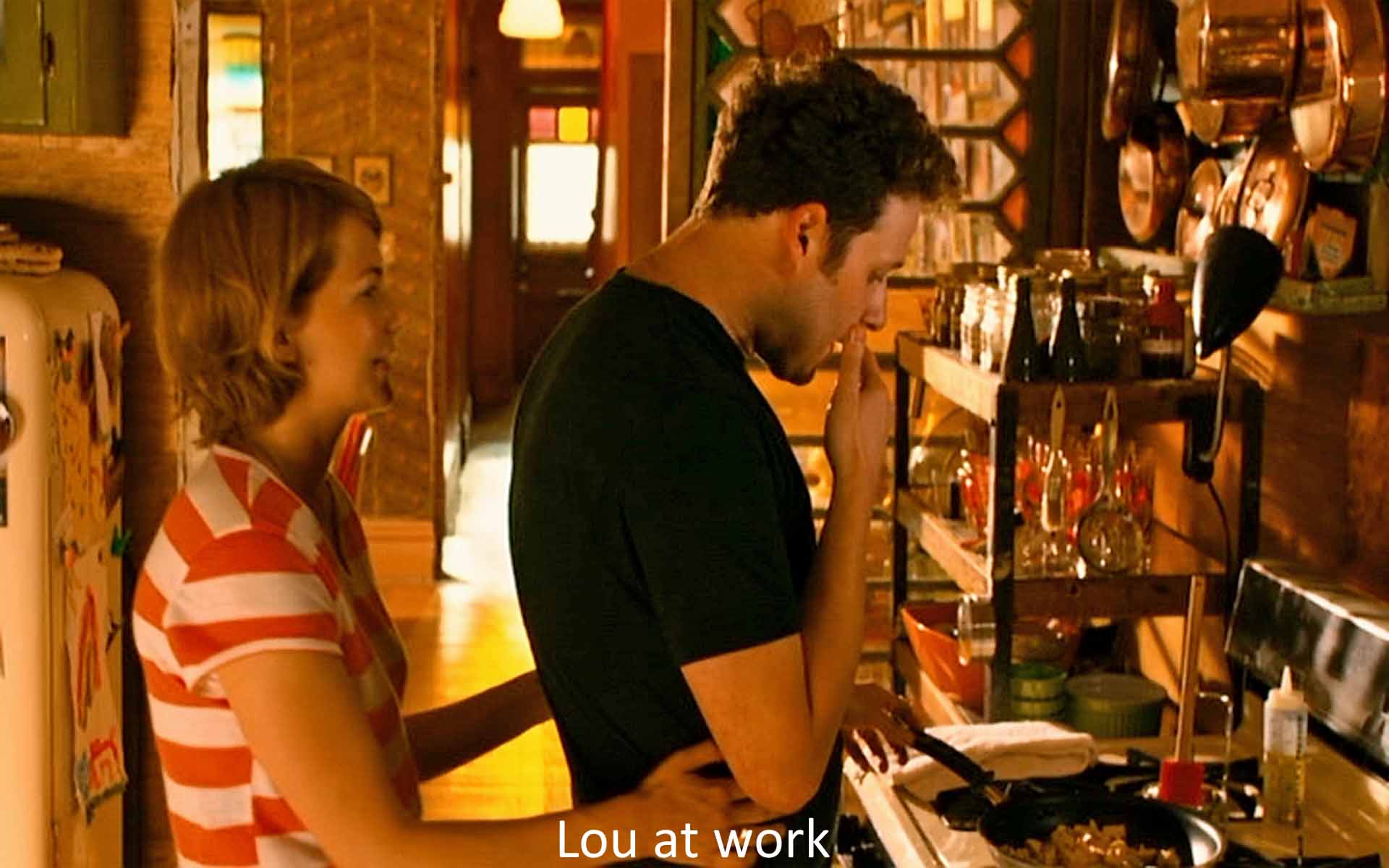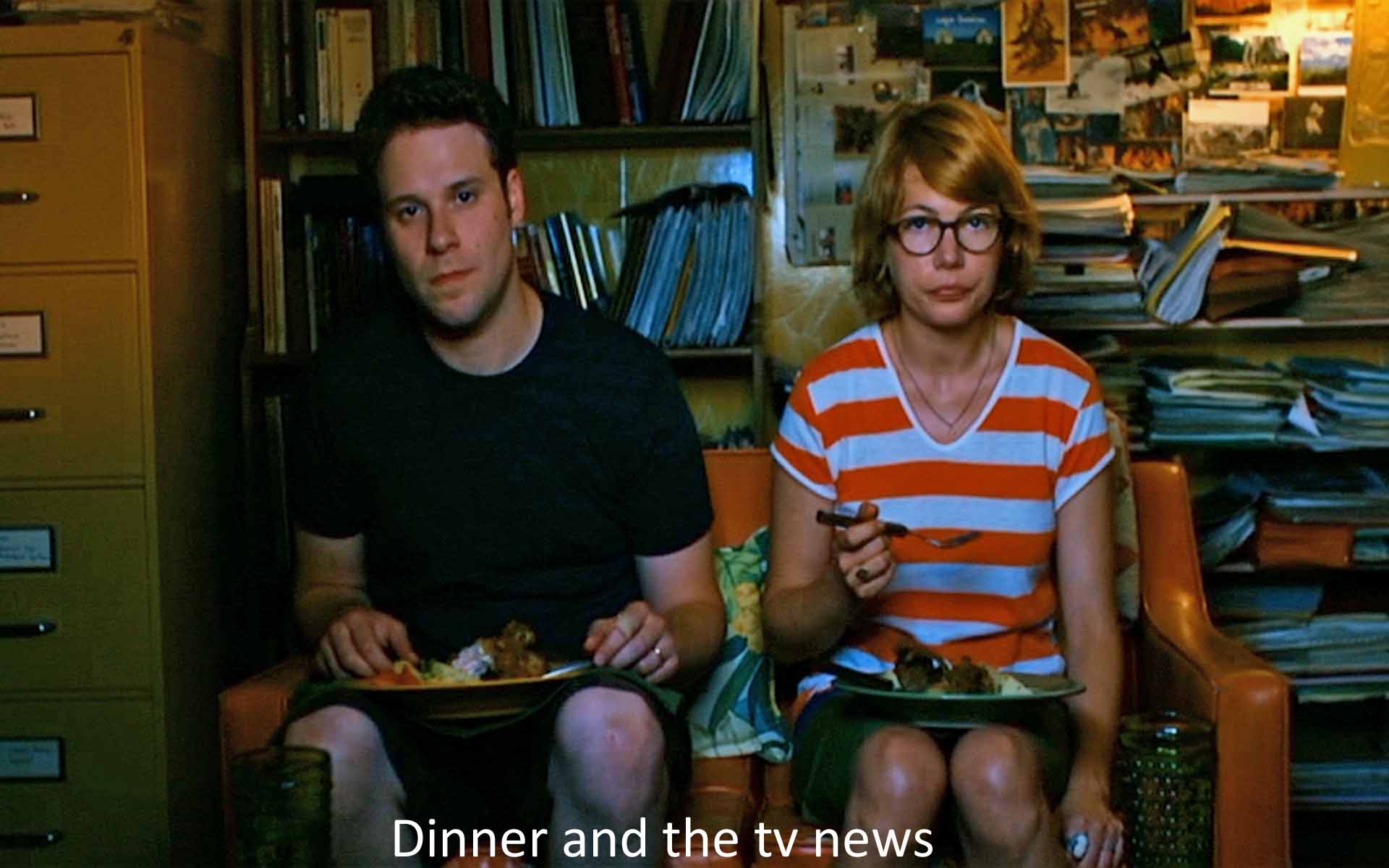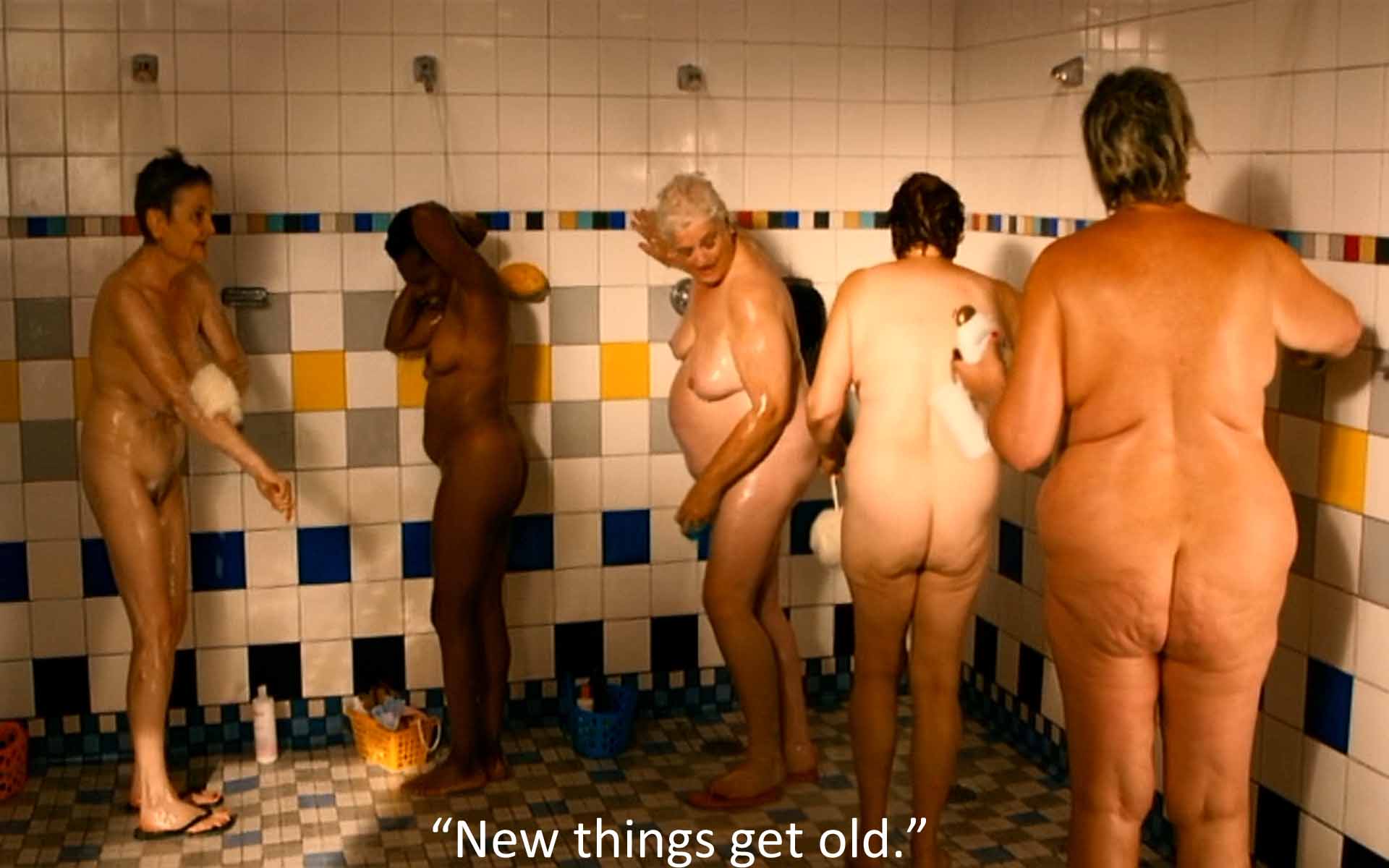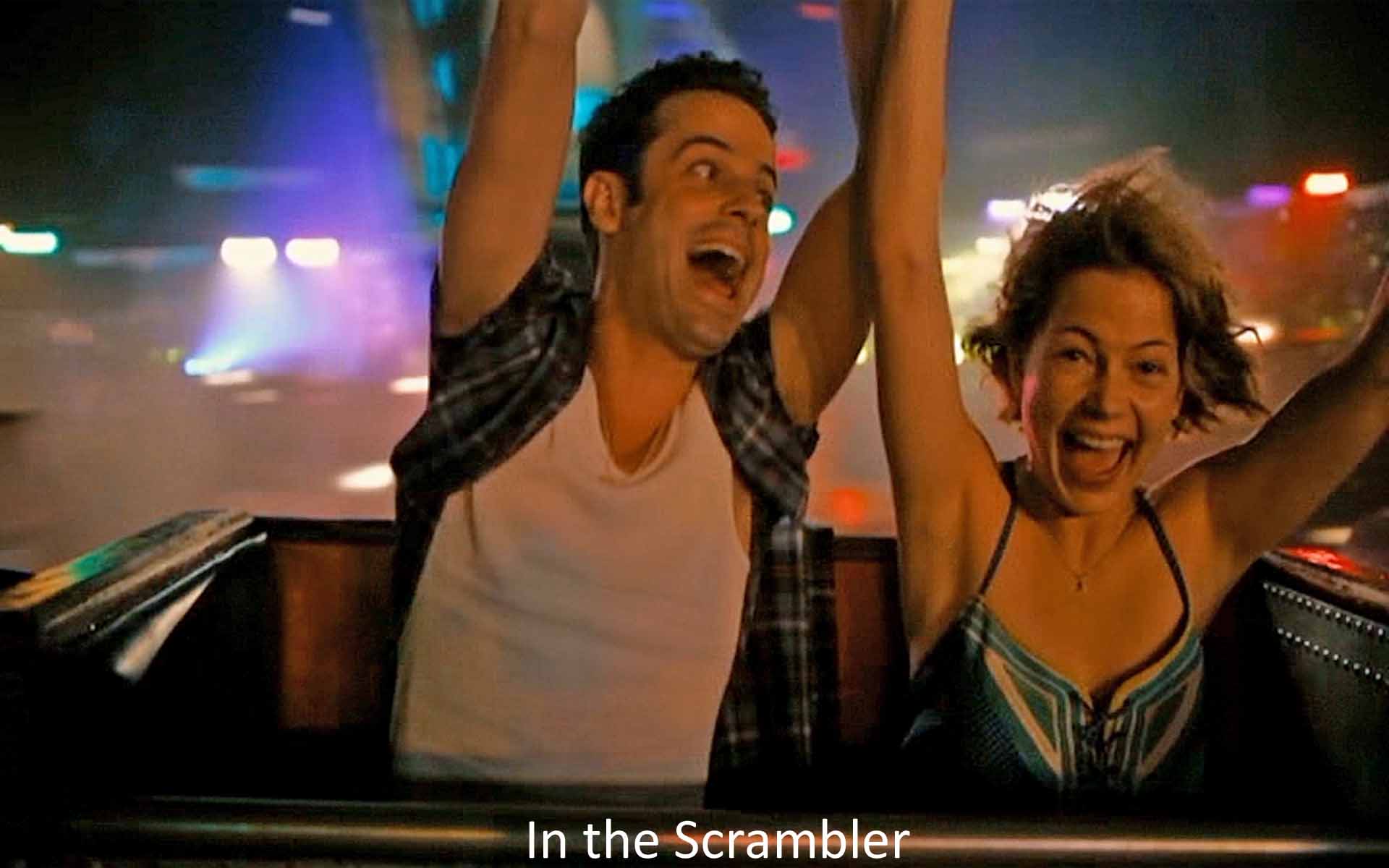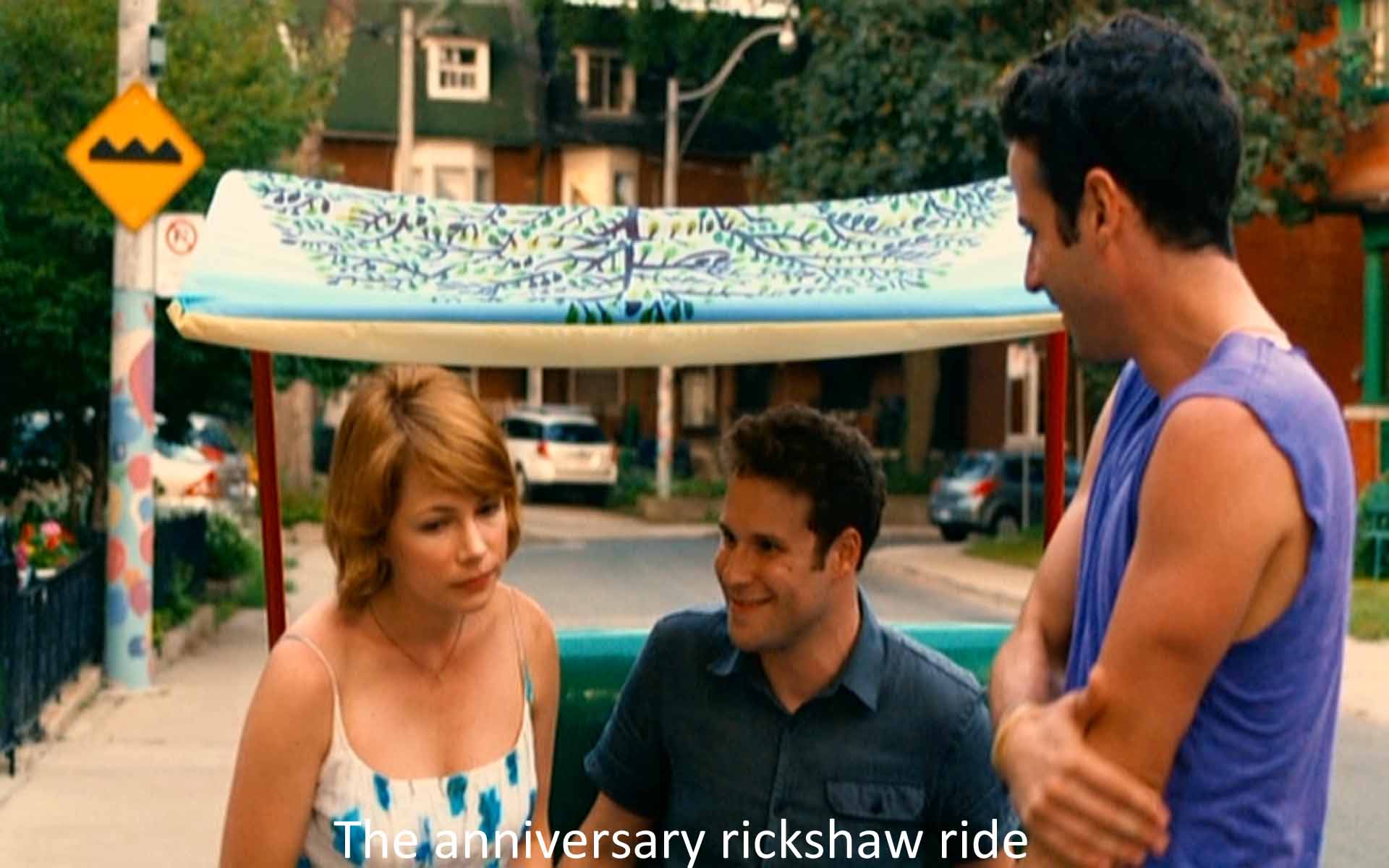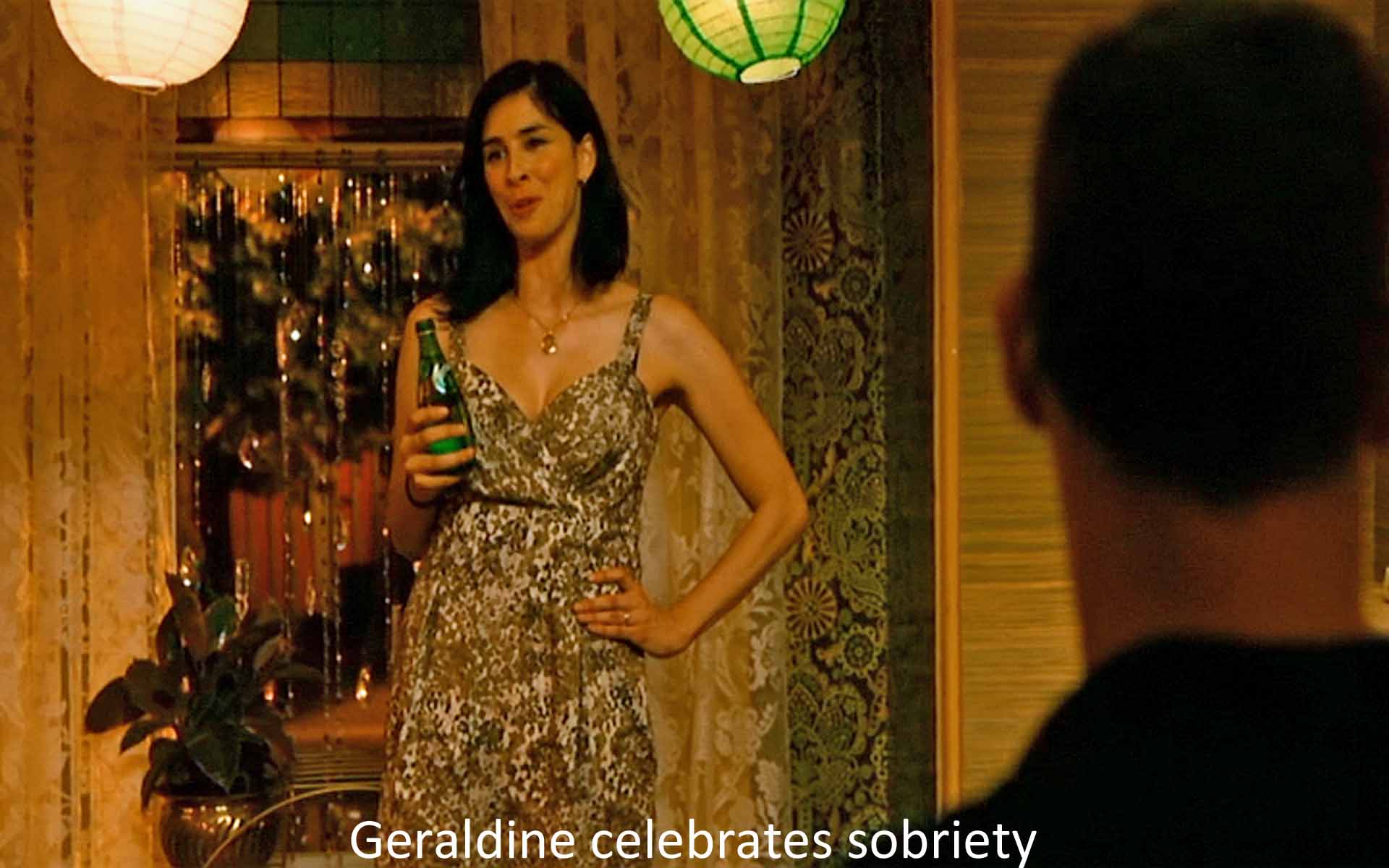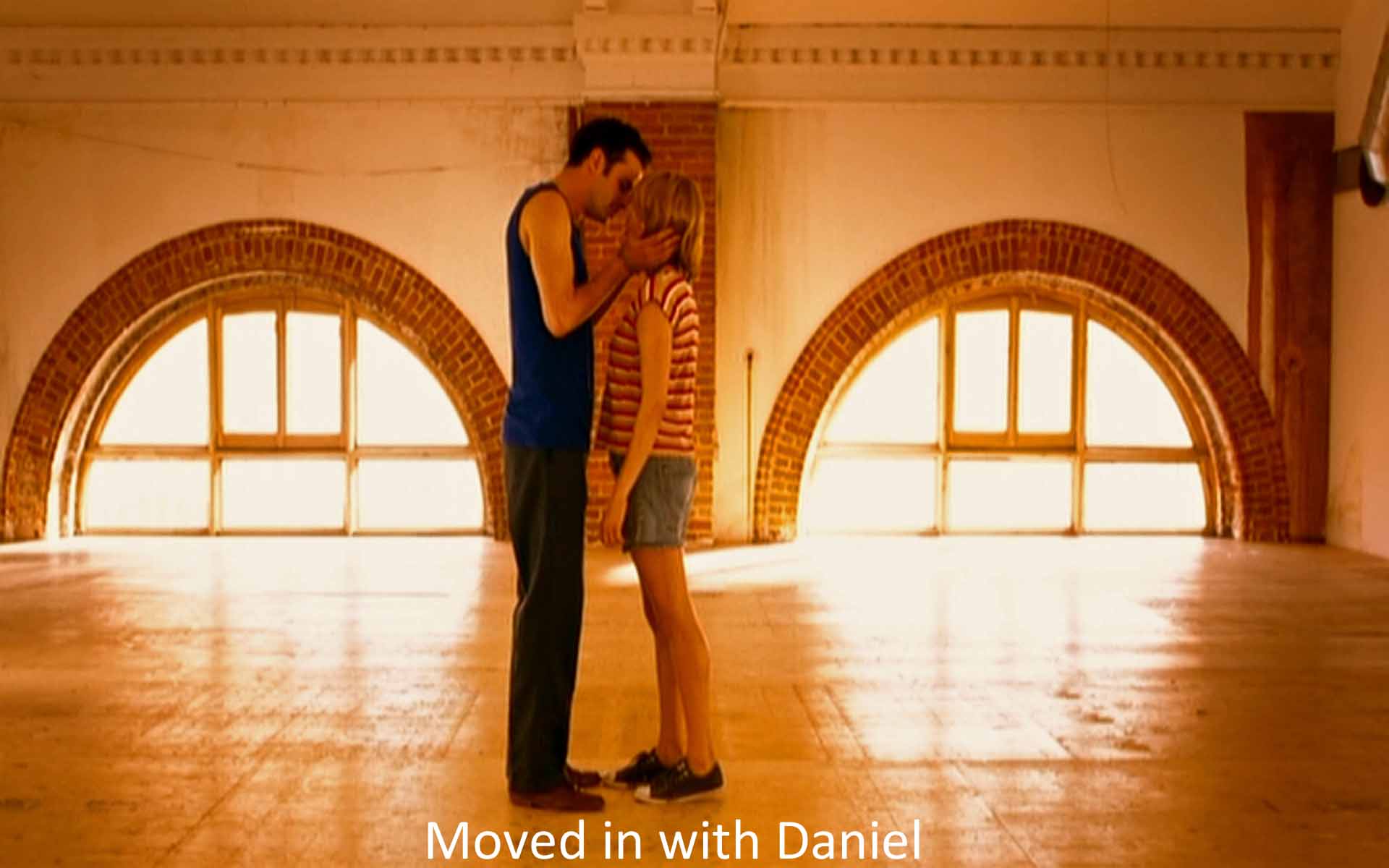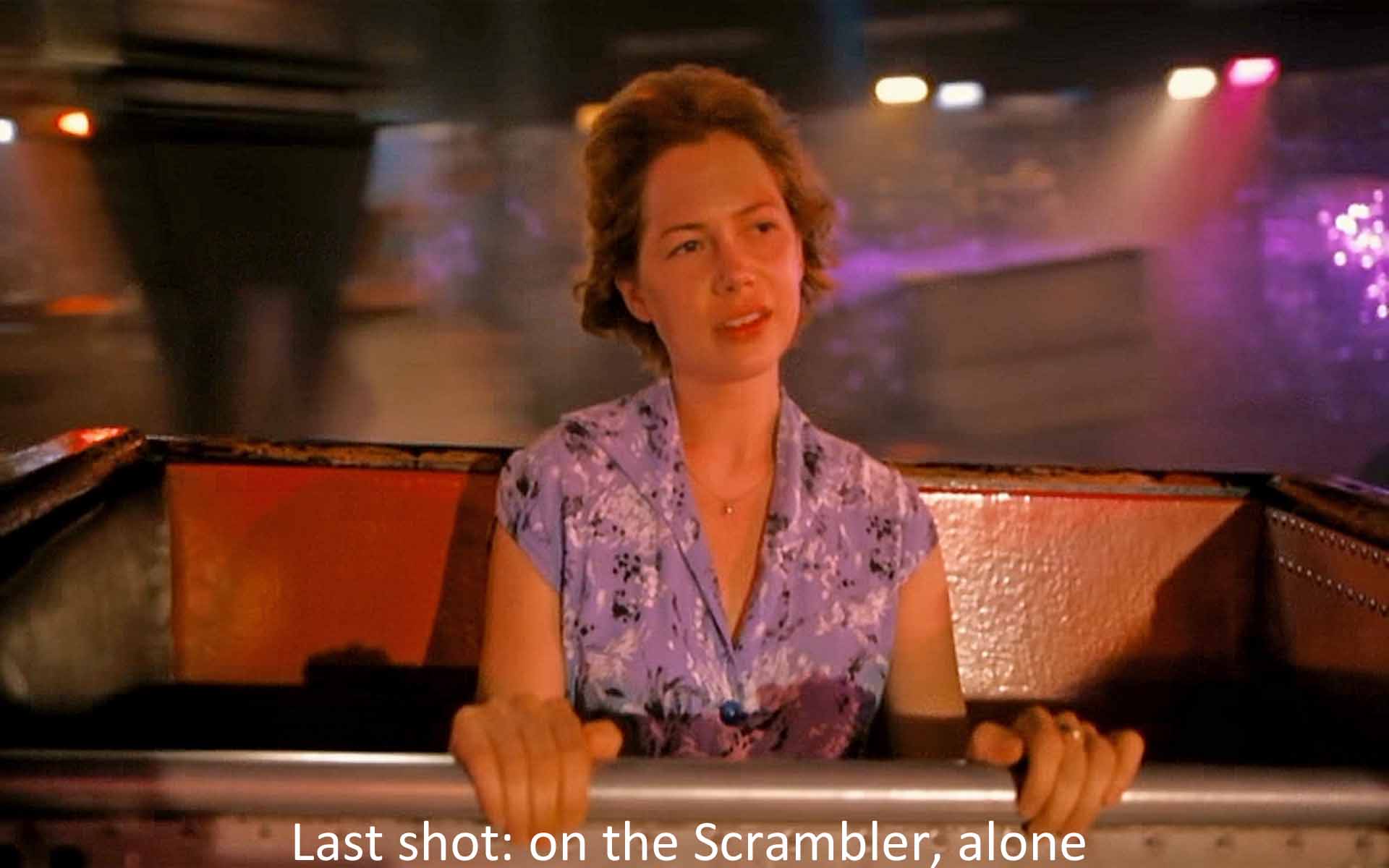Sarah Polley continues her preoccupation with infidelity in this, her second feature. We begin with Lou (Seth Rogen) and Margot (Michelle Williams) happily married for five years. This is a film about a seduction that breaks up their marriage. Margot goes off on a business trip and meets an attractive stranger, Daniel (Luke Kirby). It turns out that he lives just across the street from her and Lou. She sees more and more of Daniel. They drink martinis in the afternoon. They spend time together at the beach and at an amusement park. They ride the Scrambler there and laugh and laugh. Daniel is something new. Lou makes the same jokes over and over, and his and Margot’s house feels claustrophobic. Daniel is unpredictable and opens up spaces, downtown Toronto, the beach, a lighthouse. Lou works away at the stove on his cookbook project, while Daniel is inventive. Ultimately he is sexually inventive after Margot has moved in with him. End of story.
In a subplot, Geraldine, Lou’s sister (Sara Silverman) is an alcoholic who has been on the wagon for ten months. She falls off the wagon, when—because?—Margot goes off with Daniel, “We’re both just doing the same fucking thing, you know. . . . I do it with alcohol. You did it with love.” Drunk, she brings a box of baby chicks for her little girl, telling us they need milk.
The action focuses on the three central characters. Daniel is slim and clever. He says and does the unexpected. The first words Margot says to him are, “You’ve got a lot of nerve, sir.” Lou is big, a bit pudgy, and funny, Seth Rogen being Seth Rogen minus the fart jokes. Margot seems almost childlike, a thirteen-year-old waking to life. Michelle Williams, who plays her, says in one of the DVD features that she thinks of her as Sleeping Beauty. She has to be awakened, and it seems to me an open question whether, at the end, she has woken up. Geraldine, played by a comedian, Sara Silverman, comments on the action with a sharp tongue and says that Margot hasn’t.
Reviewers have puzzled over the characters’ odd occupations. Margot says, “I want to write,” but she isn’t writing. As for Margot’s hope to break out and write a novel, that simply seems part of her childishness (like her ordering milk on an airplane or fear of making connections in an airport). Heritage Canada hired her (improbably!) to write the official guide for the touristic Fortress of Louisbourg—that’s what took her to Cape Breton—but that’s all the writing we see her do. Lou works constantly at the stove, because he is writing a cookbook, but it consists of recipes only for chicken. And Daniel is an artist who won’t show his work. “I’m a coward.” To support himself, he pulls a rickshaw. Suggestions: Daniel’s occupation demonstrates his physique, while Lou’s is about eating. One of the many ironies in this film is that on the day of Margot and Lou's anniversary he insists on a rickshaw ride with Daniel that gives her an extended view of Daniel's lean, muscled backside. Daniel has to do with wandering, going to unfamiliar destinations, while Lou represents domesticity, familiarity, habit, and repetition (all that chicken!). Is rickshaw a play on “risky”? Daniel presents himself as a risk. Lou’s recipes by contrast are repeatable and predictable—that’s what we want from recipes—and chicken is as bland as can be. His work goes to the center of this movie, repetition. And there is something “chicken” about his repetitive domesticity, as well as something wonderful.
Lou and Margot seem to be writers—word people—if a tourist guide and a cookbook count as writing. But when they go out for an anniversary dinner, they have nothing to say to each other. Contrast that with Daniel’s seductive words to Margot as they drink martinis. He begins, “I just kissed the top of your head, ever so gently.” And ends with wild sex. And his words work.
Daniel's actions constantly suggest body: his calling on Margot to flog the “adulterer,” his rickshaw pulling, his walking alongside Margot, his paintings, watching Margot in the swimming pool, his seductive words, the amusement park ride, and finally their embraces. By contrast, Lou seems associated with planning: recipes, his publishing plans (that introduce a long phone call), all his jokes about maiming Margot, finally his shower trick to be revealed when he and Margot are in their eighties. Lou is tomorrow; Daniel is now.
The action is just the seduction, but Polley’s film works by oddnesses like the wedding Margot passes as she wanders Fortress Louisbourg. Why is it there? Or the chicks Geraldine brings—chicken but separated, childish. Slantwise, these bits tell us things about the main action. Polley wrote an elaborate 110-page screenplay for this film that reads like a novel. Of course she had to edit out a lot of it. But she replaces the prose with these cinematic happenings. Were I writing about a novel, I’d call them “transverse episodes,” doings that don’t advance the main action but provide a commentary on it. Passing a wedding tells us that this film is about marriage or, in a larger sense, togetherness. Cutaway shots to a circulating fan develop the idea of repetition.
A rather obvious oddment comes at the start of the film. Margot, wandering about Fortress Louisbourg, is drawn into a “public humiliation” demonstration for tourists. A man with a sign “Adulterer” around his neck is to be flogged. The soldier in charge calls on Margot to do her bit in the flogging. She half-heartedly swats at the victim, but Daniel in the audience calls out, “Put your back into it.” She does and, humiliated, retires, saying her first, prophetic words to Daniel, telling him he’s got a lot of nerve—as he does. Adultery with Daniel, public humiliation of Lou administered by Margot—she certainly did put her back into it.
After Margot returns from Louisbourg—see her expression as she looks at her front door—Lou and Margot put on a couple of parties. One is for family and friends to celebrate Geraldine’s not doing the unexpected, the drunken craziness of the alcoholic. Another consists of the athletic dancing common these days. The music is Leonard Cohen’s “Closing Time”: “Ah, we’re drinking and we’re dancing / and the band is really happening.” Daniel, invited on an impulse, seems sleek and sexy dancing with Margot compared to the bouncing. “But the Boss don’t like these dizzy heights.” Even the parties play off the unexpected against predictable repetitions.
There are two swimming episodes. In the first, a group of variously shaped and aged women, including Margot and Geraldine, are doing aerobics, “Aquafit,” in the pool. An instructor tells them to “Kick ‘im in the face!” (echoing Margot’s and Lou’s playful hostility, the way they threaten and insult each other). Margot brings the session to an abrupt end when she pees in the pool (more of her childishness).
Then in the shower room, she and Geraldine discuss marriage. “I really like James,” says Geraldine, “So would it be worth trading that in for something exciting with someone I might not like in 10 years?” That’s exactly the issue, isn’t it? (And Geraldine is telling Margot and us that she senses what is going on with Margot.) Another woman says, “Sometimes I’d just like something new, though.” An older woman dryly replies, “New things get old.” The camera cuts to the fat, lumpy bodies of the older women in the shower. And that’s this picture in a nutshell.
After that grim truth comes a dream-like sequence of Margot and Daniel beautifully swimming around and above each other. Margot abruptly flees when Daniel touches her body.
One of the most touching episodes comes when Margot has told Lou she is leaving him. He asks her to take a shower. She does and, from where she can’t see him, he dumps a pitcher of cold water on her. He’s been doing this every day, and every day she has been telling him to get the plumbing fixed. But now Lou reveals that it was just himself joking, and “I thought, when we’re eighty, I’ll tell Margot I’ve been doing this her whole life and she’ll laugh. Kind of a long-term joke.” Over now. She bursts into tears. Another repetition ended. Margot will get old like the ladies in the other shower scene.
Compared to Lou’s and Margot’s house, Daniel’s new loft flat is classy (and unbelievable!—have we entered a fantasy sequence of several scenes?). Leonard Cohen’s “Take This Waltz” plays, a beautiful song and a beautiful poem (a translation of a poem by Lorca):
Now in Vienna there’s ten pretty women.
There’s a shoulder where Death comes to cry.
There’s a lobby with nine hundred windows.
There’s a tree where the doves go to die.
This too has to do with repetitions (ten, nine hundred, and Cohen’s style) but also with abrupt and unexpected ruptures, like death.
Once Margot has moved in with Daniel, Polley gives us a series of far-out sexual episodes. Her camera circles, one of her favorite moves for romantic moments, its view wiped as it passes a wall—and the interruptions allow for changing and increasingly outré sex as months pass (and furnishings change and a Christmas tree appears). Are these fantasies like the lighthouse scene? Some critics say so. Reality or fantasy, though, the novelty wears off, and then Margot and Daniel lounge on their sofa like any old married couple (echoing an earlier tv-watching scene with Lou.. Eyes glazed, Margot and Daniel watch a stunningly dull tv program in which a man tells of his years studying and teaching at the Wharton Business School. Bo-o-o-o-ring! Their bathroom scene too parallels an earlier one between Lou and Margot. Margot and Daniel have achieved the repetitions of a long marriage, labeled particularly by this transverse episode of tv watching.
There is a final such episode when Geraldine falls off the wagon. Lou calls Margot to come help, and she does. Geraldine drives up drunk, with a box full of baby chicks for her daughter (chicken, but immature and separated). After Geraldine has driven off with the cops, Margot and Lou talk. She asks if he ever thinks of reconciling, but Lou says there’s no going back. As he says, “Some things you do in life, they stick.” Does he mean that she has irrevocably ended their marriage? Anyway, so much for repetition.
These oddments, the flogging, the swimming, the Scrambler, the shower trick, scenes on the beach and at the lighthouse, and all the rest bring the marriage and the seduction to life. They all fit, but they don’t advance the story as such. Instead, from the side, as it were, they tell us about the relationships and comment on them. They also tell us that Polley is a superlative artist.
Alas, she shares with the youngest generation of filmmakers an unfortunate device. She uses popular songs as a commentary on scenes. For example, "I know you just wanna be on fire" plays as Margot is simply walking down a street. That kind of hint and commentary’s fine if you know the words, but an ancient like me is not likely to. (On some DVDs, “Closed caption” will yield the words for the unenlightened.) Then too not all the young will know the lyrics to every song a filmmaker happens onto. One song, “Video killed the radio star” surely refers to new Daniel’s replacing old Lou. The song plays while Margot and Daniel are ecstatically enjoying the Scrambler, and she is realizing her feelings for Daniel. And it plays, more tellingly, a second time.
In the screenplay, after Geraldine’s breakdown, Margot and Lou talk. Finally, she walks away from him, crying, and we get a repetition of the muffin baking scene that opened the film. Both times the music says, “This is not a love song . . . I’m adaptable and I like my new role.” Making muffins, making a life? The screenplay ends as “The muffins rise. She watches them, the expression on her face a curious mixture of peace, yearning, contentment, and longing.” (That’s asking a lot of Michelle Williams.)
Polley includes this end-of-film but she doesn’t end the film there. Instead Margot goes back to the Scrambler where “Video killed the radio star” is again playing. The Scrambler is a highly symbolic amusement park ride that circles round and round repetitively but breaks up each circle with a wild, exciting, even scary, whirl. In the final shot, Margot sits in the whirling alone and her face goes from a glum, lost look to an ecstatic recapture of her fun with Daniel on this very machine and, perhaps as she realizes that that is over, her pleasure fades to a neutral, then sad expression. There is something in her sadness about our human fate, that “things new get old.”
"Video killed the radio star"—that plays both times Margot rides the Scrambler. The first time Margot and Daniel are ecstatically enjoying the Scrambler—and she is realizing her feelings for Daniel. This first time the song refers to her replacing Lou with Daniel. The second time, the song plays during the melancholy moment of her recalling an earlier joy, but now she’s alone. Now it’s not the same. Things have changed. The new boredom has “killed” the old joy.
This film is all about repetition and not-repetition. That’s what domestic life, maybe all of life, is: repetition, and we long for something unexpected and new, something that breaks up the repetition. That’s what art is: the unexpected but right, something special against a background of sameness. That’s why Polley doesn’t end her film with Margot making blueberry muffins a second time. That repetition would suggest that Margot has lapsed into the same repetitions with Daniel as with Lou. Polley has already shown that with the man from Wharton. Adding another Scrambler scene, this time with Margot and no sexy Daniel, suggests something else, something new: that we are, ultimately, alone. It is finally up to each one of us to find a viable relation between repetition and novelty. And Margot hasn’t done that. She just looks puzzled and nostalgic.
Polley’s second feature didn’t fare as well as her first. My Infallibles, the vox populi on IMDb, give this only a 6.6 compared to a 7.6 for Away from Her. Sara Silverman called this “the feel-bad movie of the year,” and it is not an easy movie to like. I’m a husband, and I don’t enjoy movies about wives being seduced. But I have to marvel at Polley’s artistry, how she has taken a cliché of a story and created from it an exciting meditation or, as a postmodernist would say, an “interrogation” of some of the most profound tensions we humans face. How do we reconcile our need for predictability and security with our need for the unexpected delight? It’s a fine movie and a bold director who ask such a question.
